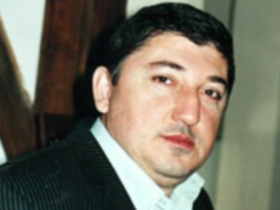60 bullets for Aushev (weekly review) By Magomed Toriyev, special to Prague Watchdog
Maksharip Aushev, the Ingush opposition leader who was killed near the Kabardino-Balkarian capital Nalchik on October 25, 2009, survived his colleague, Magomed Yevloyev – assassinated in August 2008 – by one year and two months.
More than two and a half thousand people have come to attend Aushev’s funeral in Surkhakhi, his ancestral village. People continue to arrive in a steady stream – in accordance with Ingush tradition, the tyazet (funeral) will last three days.
Many people were surprised by his position: a successful businessman, one of the richest men in the republic, he put his own life at stake. His engagement in politics was forced on him by circumstances. In September 2007, his son and nephew were kidnapped and threatened with murder, but by his campaigning efforts he managed to get them freed. Not even the killing of Magomed Yevloyev was able to dissuade him from political activity. Although he helped the Ingush opposition not by word but by deed – with financial support and the organizing of rallies and protests – Aushev was hardly a revolutionary. He believed it was not possible but necessary to engage in dialogue with the authorities. On only one point did he categorically refuse to compromise: a demand that Magomed Yevloyev's killers be punished, and that the practice of murder and kidnapping in Ingushetia be brought to an end.
Aushev had long been persecuted by the authorities. After the house of his relatives was burned down by the law enforcement agencies, he lived with semi-legal status, and attempts were made to force him to give himself up. His home, as well as his business offices, which had served as the opposition’s headquarters, were subjected to constant raids and searches. In 2008 he was arrested on charges of organizing public disorder and spent a few months in prison in Nalchik.
After Yevloyev’s killing, Aushev took over the running of the Ingushetiya.ru website, leaving it only after President Yunus-Bek Yevkurov took power. Along with other opposition figures, Aushev attended the first ever official meeting of Ingushetia’s government and opposition in Magas.
Aushev supported Yevkurov’s initiatives aimed at starting a dialogue of the Ingush people with the authorities, and even joined an expert council set up by the office of the Russian government’s human right ombudsman, Vladimir Lukin. But Aushev’s life did not become more secure after the resignation of former Ingush President Murat Zyazikov. Several attempts were made kill or kidnap him, and his nephew, who was driving his car, was murdered. A month ago, the FSB tried to kidnap Aushev on the outskirts of the republic’s capital, and only the intervention of bystanders saved his life.
Aushev had recently returned from Turkey to organize his son’s wedding of his son and deal with problems of business. He was openly shadowed, and although his supporters and relatives constantly accompanied him and several times cut off the pursuers or detained them, the pursuers were allowed to go free – they showed passes of the FSB or Interior Ministry. This protracted confrontation with the security forces was bound to end badly – in the Caucasus, no opposition figure or rights activist has so far managed to survive a conflict with them.
Aushev was travelling to Nalchik in Kabardino-Balkaria with his sister, Tamila Dzeitova, when his car was overtaken and came under fire. Reports say that more than 60 bullets were used in the attack, and Aushev had no chance. By some miracle, Dzeitova survived – after five operations she is still in a critical condition. Many hope that she will recover and give a description of the attackers, but whether this will do anything to further the investigation is a moot question. Likewise the Kabardino-Balkarian interior ministry's promise of a cash reward for information on the killers.
The names of the organizers of Aushev’s and Yevloyev’s killings are known. In Aushev's case five possible scenarios have now been considered, but none of them point to the people who hounded him and tried to kidnap him.
Accusations against Yevkurov are now being heard, but the likelihood of his involvement in the murder is almost nil. The most probable supposition is that Aushev fell victim to the system of terror which he had worked to defeat which he continued to resist until his final day. In the last interview he gave, he talked about how state terror was organized in Ingushetia under Murat Zyazikov, how the security services kidnapped and murdered innocent people while Zyazikov and his team bought off the insurgents, paying them tribute money in exchange for their own personal security.
Aushev’s business colleagues say that he was totally devoted to his homeland, and that emigration was always something he considered unacceptable. Nor did he try to use his family connections (his relative Ruslan Aushev was a former president of the republic) to obtain preferential treatment for his business.
The authorities failed to break Maksharip Aushev, to force him to renounce the struggle that had become his life’s mission, even though he began it under duress. Neither prison, persecution nor death threats were able to make him abandon his conviction that his people have a right to live like human beings. His enemies showed that they rated his activities very highly – they killed a man who truly stood in their way, and whom they feared.
Photo: kasparov.ru. (Translation by DM) (P,DM) RELATED ARTICLES:
· Ingushetia revisited (PW, 2.3.2009)
DISCUSSION FORUM
|

